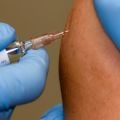One in four women prisoners self-harm every year
As many as one in four women prisoners in England and Wales self-harm every year, with women in prison four times more likely to self-harm than men.
The findings come from the largest ever study of self-harm in prisons led by Dr Seena Fazel and Professor Keith Hawton from the University of Oxford.
The researchers examined the prevalence of self-harm in all prisoners in England and Wales between 2004 and 2009 and the results are published in the medical journal The Lancet.
There were almost 140,000 incidents of self-harm in this period, involving over 26,500 inmates.
Incidents of self-harm were 10 times higher in female than in male prisoners, and around 30 times that of the general UK population (0.6%). The study found that 20–24% of female prisoners and 5–6% of male inmates self-harm every year.
Despite reductions in suicide rates in prisons over this six-year study period, incidents of self-harm did not decrease.
'Repetition rates were striking,' said Dr Fazel, a Wellcome Trust Senior Research Fellow in the Department of Psychiatry. 'If a female prisoner self-harmed, she would [be likely to] self-harm eight times per year, and there were 102 women (and two male) inmates who self-harmed more than 100 times per year.'
The researchers found that several factors increased the risk of self-harm in both sexes. These were being under 20, being white, being unsentenced or having a life sentence. Among female prisoners, having committed a violent offence was also a factor.
Cutting and scratching were the most common methods of self-harm in both sexes. This was followed in men and teenage boys by poisoning, overdose, or swallowing objects, and self-strangulation in women and adolescent girls.
Importantly, self-harm in prison was also found to be a strong risk factor for suicide in prison, particularly among men. The annual suicide rate among male prisoners who self-harm (334 per 100,000) is around four times that of the general male prison population (79 per 100,000).
Dr Fazel said: 'While self-harm is a substantial problem across the board, it is a particularly serious issue for women in prison who make up only 5% of the prison population but account for half of all self-harm incidents.
'Moreover, now we know the extent to which the risk of subsequent suicide in prisoners who self-harm is greater than the general prison population, suicide prevention initiatives should be changed to include a focus on prisoners who are self-harming, especially repeatedly.'
Commenting on the study in a separate article in The Lancet, Dr Andrew Forrester from King's College London and Dr Karen Slade from Nottingham Trent University call for more research to address the questions of 'why' and 'what works' to reduce the stagnating self-harm rate in prisons.
The study was funding by the Wellcome Trust, the National Institute for Health Research, the National Offender Management Service, and the Department of Health.
 New study estimates NHS England spends 3% of its primary and secondary care budget on the health impacts of temperature
New study estimates NHS England spends 3% of its primary and secondary care budget on the health impacts of temperature
 International collaboration launches largest-ever therapeutics trial for patients hospitalised with dengue
International collaboration launches largest-ever therapeutics trial for patients hospitalised with dengue
 Oxford-built multi-agent assistant for cancer care to be piloted in collaboration with Microsoft
Oxford-built multi-agent assistant for cancer care to be piloted in collaboration with Microsoft
 World's first Phase II Nipah virus vaccine trial launch
World's first Phase II Nipah virus vaccine trial launch